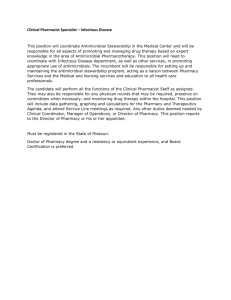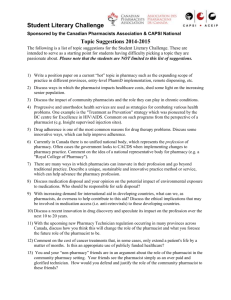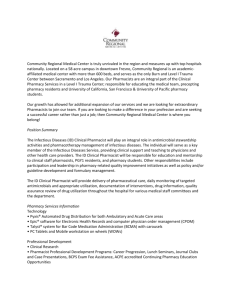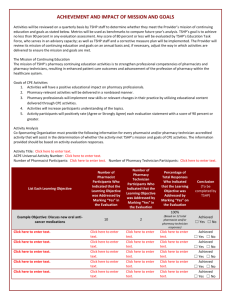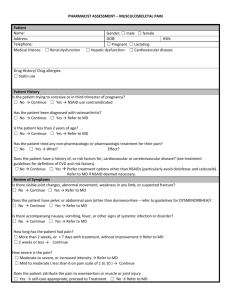Hussein Elsaghir ENG 3010-010 Discourse Community: Pharmacy
advertisement
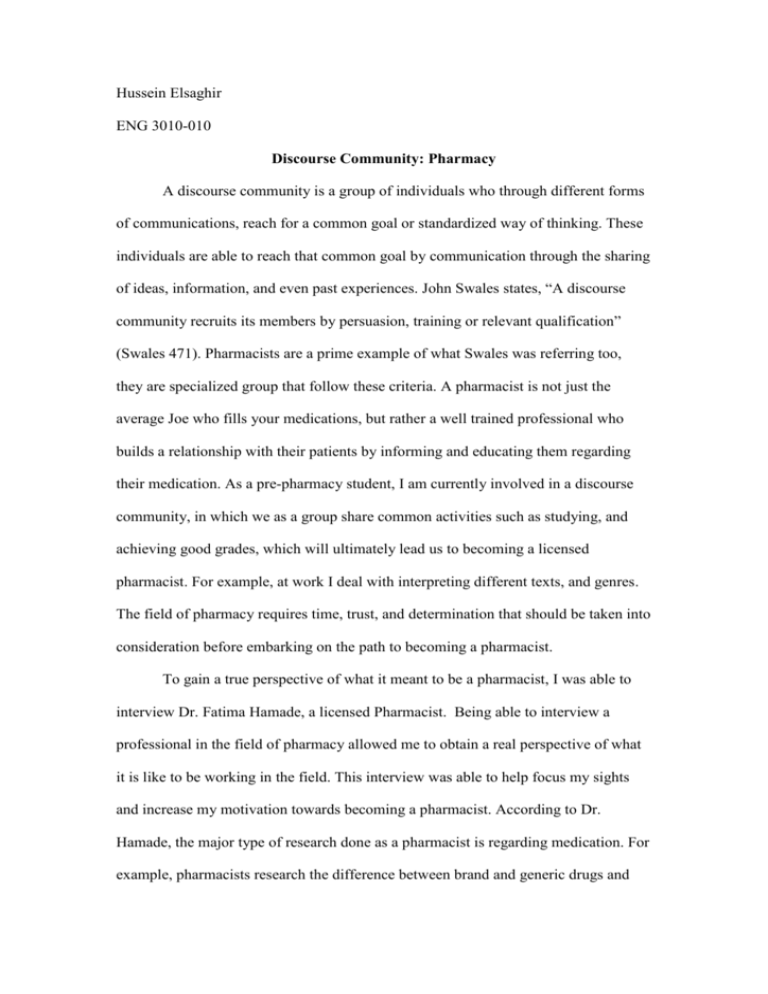
Hussein Elsaghir ENG 3010-010 Discourse Community: Pharmacy A discourse community is a group of individuals who through different forms of communications, reach for a common goal or standardized way of thinking. These individuals are able to reach that common goal by communication through the sharing of ideas, information, and even past experiences. John Swales states, “A discourse community recruits its members by persuasion, training or relevant qualification” (Swales 471). Pharmacists are a prime example of what Swales was referring too, they are specialized group that follow these criteria. A pharmacist is not just the average Joe who fills your medications, but rather a well trained professional who builds a relationship with their patients by informing and educating them regarding their medication. As a pre-pharmacy student, I am currently involved in a discourse community, in which we as a group share common activities such as studying, and achieving good grades, which will ultimately lead us to becoming a licensed pharmacist. For example, at work I deal with interpreting different texts, and genres. The field of pharmacy requires time, trust, and determination that should be taken into consideration before embarking on the path to becoming a pharmacist. To gain a true perspective of what it meant to be a pharmacist, I was able to interview Dr. Fatima Hamade, a licensed Pharmacist. Being able to interview a professional in the field of pharmacy allowed me to obtain a real perspective of what it is like to be working in the field. This interview was able to help focus my sights and increase my motivation towards becoming a pharmacist. According to Dr. Hamade, the major type of research done as a pharmacist is regarding medication. For example, pharmacists research the difference between brand and generic drugs and their effect on the patient taking them. This is a key idea because a certain brand for a medication may work better for one individual rather than other. This is an important factor regarding the patients, because certain patients may gain the side effects of the medications due to the inactive ingredients that they are composed of. Along with the type of research done, Dr. Hamade also explained the different forms of texts that are used when working in the field, such as prescriptions and flu-shot forms. Swales claimed that recruiting professionals in the field creates a discourse community and having a trained pharmacist best serves his idea pertaining to discourse communities. The last three years of my life has really shown my determination to enter the field of pharmacy. I am currently enrolled in my third year of studying pre-pharmacy, and entering my second year as a certified Pharmacy technician working at Rite Aid Pharmacy. Being able to work in the field I study and having a hands on approach has been a tremendous help in reaching my ultimate goal of becoming a licensed pharmacist. With many colleges having great Pharmacy programs, my goal is to attend and graduate from The Eugene Applebaum College of Pharmacy and Health Sciences earning a Doctorate of Pharmacy. During the interview, I asked Dr. Hamade how was the requirements changed pertaining to pharmacy? She replied, “ Pharmacy has become a very competitive field, and the road is filled with rigorous study and commitment.” The road to becoming a pharmacist may seem to be superimposed with hardships, but the benefits in areas of communication and interpretation are abundant. Lexis is a key characteristic of what makes up a discourse community. Lexis the choice of vocabulary, or jargon a discourse community uses for members to communicate with one another. As a pharmacist or even a pharmacy technician like myself the use of vocabulary and grammar is a factor that separates our discourse community from another. The use of specific terminology or abbreviations allows for a better workflow and clearer form of communication among my fellow co-workers and I. A SIG which mean “Latin Signa” or in laymen’s term “label”, is a form of lexis which creates a bridge of communication between the pharmacy and the physician. A typical prescription will have a SIG like “T, 1,TA, PO, QID”, now this may seem like chicken scratch to the patient, but as a member of this discourse community it allows us to interpret it as “take one tablet by mouth four times daily”. There are many other abbreviation or terms that a pharmacist should be familiar with as well. This specialized form of communication allows for a clear understanding when typing the SIG on the label of a prescription. Having the correct SIG is very crucial because it gives the patient instructions pertaining to their medications in order to control dosage, abuse, and minimize the chance of side effects. “A discourse community utilizes and hence possesses one or more genres in the communicative furtherance of its aims” (Swales 472). Genres can be altered or formatted to fit any occasion some more formal than others. When entering this discourse community, a more formal and professional transition is needed. This transition is necessary because when dealing with emails, prescriptions, and confidential patient information we must be formal and precise to minimize the margin of error when communicating this information to and from a physician’s office. As a student, I am in a discourse community among my peers where formality is not as stressed, where we can exchange information without the need for a formal arrangement such as a text message. As a pharmacist, the documentation and research done follows a strict style known as the American Medical Association (AMA). This style of citation is used in the field of medicine because it has a scientific approach; it sets up guidelines to simply the intake of tables, charts, and general information regarding the field of medicine, and in this case pharmacy. A major area of study and research within the field of pharmacy is the fight against diabetes. As a technician I see the results and how patients who are diagnosed with diabetes struggle to survive, and how their relationship with their pharmacist motivate them to continue on fighting and hopefully one day beating this life threatening disease. As a pre-pharmacy student and a certified pharmacy technician I am involved in two different discourse communities that will aid in my final goal of becoming a licensed pharmacist. Through the use of genres, lexis, and research I will be able to achieve this goal. The transition might be difficult, but being able to join a community of specialized professionals in the field of pharmacy and offer my help in the promotion of positive health is well worth the hardships. Citations: 1. Swales, John. “The Concept of Discourse Community.” Writing About Writing. Ed.Wardle and Doug Down. Boston: Bedford/St. Martin’s, 2011. 471-472. Accessed September 20, 2012 2. Hamade, Fatima. Rite Aid Pharmacy, Taylor, MI, Personal Interview 14 September. 2012 3. Dictionary. Website. Available at http://dictionary.reference.com/browse/sig. Accessed September 22, 2012
